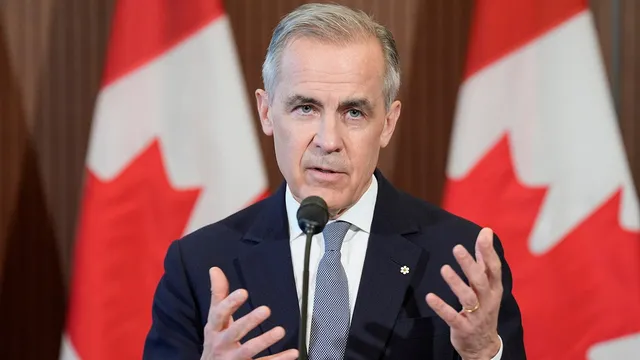
Trump engages in productive call with Canadian Prime Minister Mark Carney
2025-03-29 00:00- President Donald Trump and Canadian Prime Minister Mark Carney held their first conversation on March 28, 2025.
- Carney, who recently took leadership in the Liberal Party, emphasized the need for a renegotiation of Canada-US relations.
- Both leaders plan to meet after Canada's election to discuss politics and trade, indicating a proactive approach to future cooperation.
Express your sentiment!
Insights
In a notable development in U.S.-Canada relations, President Donald Trump engaged in an 'extremely productive' phone conversation with Canadian Prime Minister Mark Carney on March 28, 2025. This call followed Carney's recent election as the leader of the Liberal Party, where he won with significant support and succeeded former Prime Minister Justin Trudeau. The conversation marked the first direct communication between the two leaders, with both expressing optimism about future collaboration between their nations. During the call, Trump remarked on the agreement reached on numerous topics and indicated plans to meet immediately following Canada's upcoming election scheduled for April 28, 2025. The intention behind the meeting aligns with a wider goal of fostering dialogue regarding politics, business, and various other elements that might benefit bilateral relations. This is essential as both countries navigate an evolving political landscape and seek to redefine their partnership moving forward. Carney had previously characterized the traditional relationship with the United States as having changed, asserting that the old model, built on deep economic integration and close military ties, was obsolete. He emphasized Canada's need for autonomy and power in its dealings, which signals a shift in diplomatic approach. This proactive stance is indicative of the necessity for Canada to chart its course amidst Trump's complex diplomatic style, which has often been unpredictable and strong-handed, especially concerning trade agreements. In addition, the timing of the call and the planned future meetings come at a crucial juncture for the Liberal Party, as Carney campaigns for a parliamentary seat in Ottawa. The upcoming elections will be critical not only for Carney's leadership but also for establishing the nature of Canada-U.S. relations. Previous comments from Trump revealed indifference to Canada's political landscape, given he had stated he did not care who was in power as long as they were respectable. The outcome of Carney's efforts in the election will determine the future trajectory of Canadian politics and its engagement with the United States.
Contexts
The history of U.S.-Canada relations has been characterized by a unique and complex partnership, shaped by geographical proximity, shared values, and economic interdependence. From the early days of British colonial rule to the present, the two nations have navigated a path marked by collaboration and occasional tension. The American Revolution in the late 18th century created early divisions, as loyalist populations migrated to Canada, but the two countries largely reconciled through mutual interests in trade and security, particularly during the War of 1812. The conflict ultimately paved the way for a greater understanding between the nations, as both faced common threats and sought to promote stability in North America. In the 19th century, U.S.-Canada relations deepened, especially with the expansion of the United States and the building of the transcontinental railroad. The two countries began to formalize their relationship through treaties and agreements, including the Reciprocity Treaty of 1854, which laid the groundwork for significant trade partnerships. The construction of railroads further facilitated cross-border commerce, culminating in increased economic cooperation. However, the disparity in cultural and governance systems would often challenge relations, particularly in matters involving territory and immigration. The 20th century marked a pivotal turn in U.S.-Canada relations, particularly during and after the two World Wars. Both countries fought side by side, solidifying their military and diplomatic ties. The establishment of organizations such as the North Atlantic Treaty Organization (NATO) and the defense collaboration during the Cold War deepened those bonds. Economic cooperation continued to grow with the introduction of the Canada-U.S. Free Trade Agreement in 1989 and subsequently the North American Free Trade Agreement (NAFTA) in 1994, which transformed trade relations and integrated the economies of the three North American countries. In recent years, U.S.-Canada relations have continued to evolve in response to global challenges, such as climate change, national security, and trade disputes. Issues such as tariffs, immigration policies, and environmental regulations have led to discussions and negotiations to address conflicts while maintaining the longstanding friendship. The two nations continue to cooperate on critical issues like border security, health, and economic recovery in the aftermath of the COVID-19 pandemic. As the relationship progresses, it remains essential to balance national interests while honoring the historical ties and shared democratic values that have long sustained the partnership between the United States and Canada.